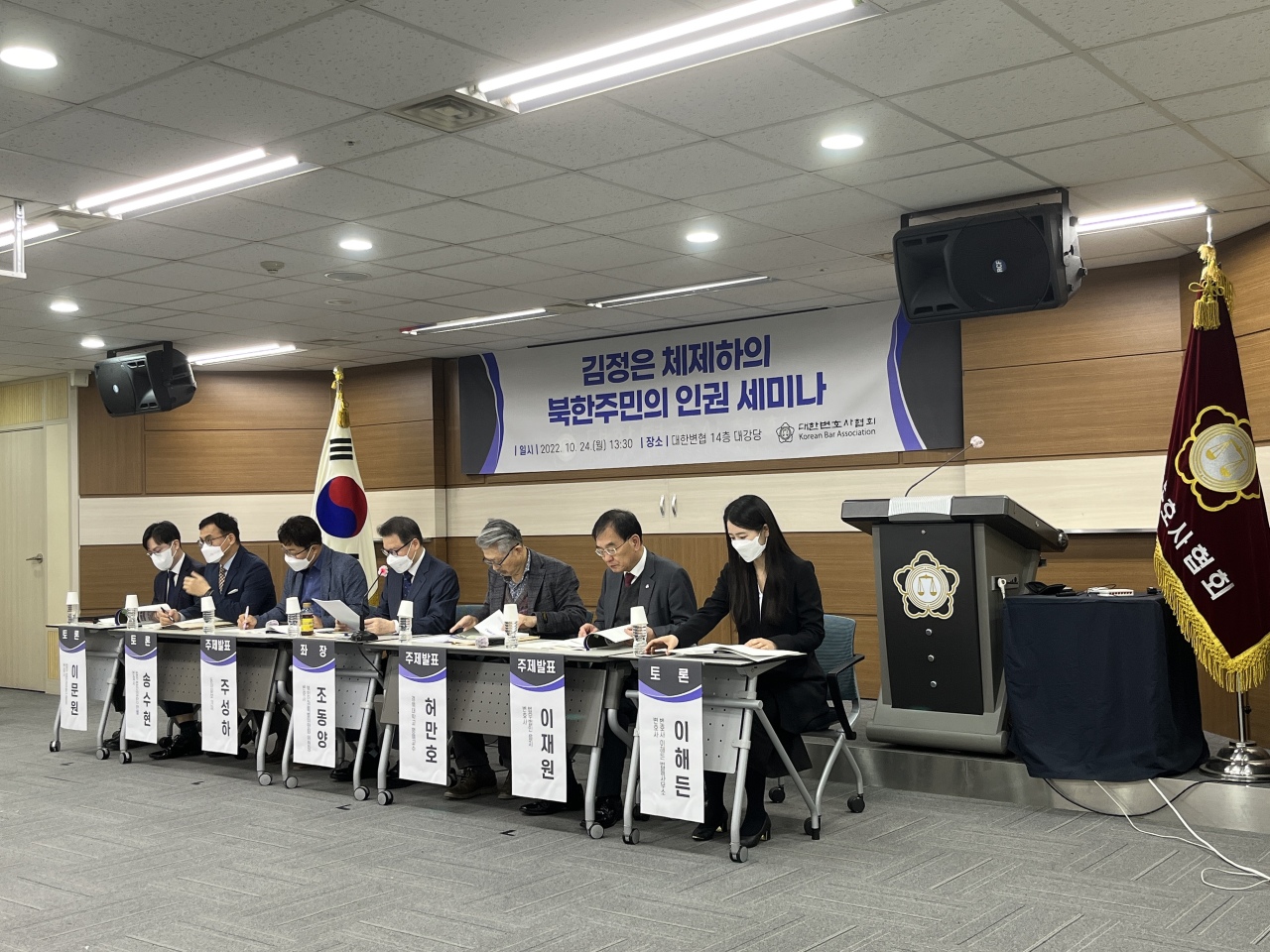South Korean lawyers said Thursday the human rights situation in North Korea under Kim Jong-un remains dire, and called for more action from the South Korean government.
Speaking at a seminar hosted by the Korean Bar Association, Joo Sung-ha, who left North Korea in 2002, said attempts to flee the country have been more severely punished over the past five years there.
“During the Kim Jong-il era, people who tried to defect because they were unable to feed themselves and family were sometimes let off the hook,” he said. “But now, if people are caught defecting to South Korea, they would be considered political criminals.”
He said the would-be defectors are typically given 15 years, maybe eight years if they are lucky, which is “basically a death penalty.”
“It’s highly unusual for people to survive a sentence that long,” he said, adding that although North Korea does have lawyers, there was no known record of political crimes actually being tried at a court.
He said that consumption of foreign cultural content was also considered a political crime punishable by up to 15 years under the act against “anti-regime culture” adopted in December 2020.
“Like I’ve said, if you get sentenced to five years or longer the chances of your survival are very low.”
These recent moves went on to make North Korea an “extremely closed society” -- even moreso than it already was, he said.
“Even a tighter muzzle” on the freedom of speech was anticipated at this stage in Kim Jong-un’s rule, Cho Dong-yang, an attorney-at-law at Seoul-based lawfirm Daeryook & Aju, said.
“It’s been more than 10 years since Kim Jong-un assumed power, and his regime has stabilized. The remaining task is the idolization campaign,” he said.
He said because the survival of the regime reigns supreme over all other values, North Korea “willingly deprives its people of fundamental rights, especially their rights to freedom, if it means it can maintain its regime and deter the possibility of an unrest.”
Song Soo-hyeon, a lawyer at Seoul-based law firm Hanbyol, said that a “national self-reflection” was in order for South Korea, which could be taking on a “larger, leading role” in the international efforts to tackle North Korea’s human rights challenges.
He said that South Korea recently losing its re-election bid to serve at the United Nations Human Rights Council may be one example of how the country is “failing to fulfill its obligations in terms of human rights.”
“We received fewer votes than countries like Bangladesh, Vietnam and Kyrgyzstan, which aren’t deemed leading countries in human rights,” he said.
“While our Foreign Affairs Ministry said there were various reasons that led to our losing a seat at the Human Rights Council, many experts have said that the Moon Jae-in administration has not been as proactive in calling out North Korea for its human rights abuses.”
He said that South Korea had a greater responsibility to improve and protect the basic rights of North Korean people, who are under the South Korean consitution, are also its people.
Kim Tae-hoon, the president of the Lawyers for Human Rights and Unification of Korea, agreed that South Korea “has not been living up to its obligations” under the country’s own laws.
The North Korean Human Rights Act, which was passed in 2016 after being stalled for years at the National Assembly amid opposition by the Democratic Party of Korea, stipulated the launch of a government-run foundation and appointment of an envoy for North Korea human rights issues.
“The envoy position remained unfilled throughout the Moon administration. Over the Moon administration, the justice ministry office in charge of North Korea human rights suffered reductions in budget and staffing,” he pointed out.
This was a “grave dereliction” given that North Koreans have been “victims of serious human rights violations” over three generations of the Kim regime, he argued. “The kind of human rights abuses perpetrated by the North Korean regime are almost unprecedented in their scale and gravity among contemporary societies, often amounting to crimes against humanity.”
Citing the April report by Tomas Ojea Quintana, then-UN special rapporteur on North Korea human rights, he pointed out that the human rights situation there appears to have deteriorated under Kim Jong-un.
Song of Hanbyol added that North Korean regime’s abuses directed at non-North Koreans needed to be dealt more seriously as well, referring to the 2020 fatal shooting of a South Korean government official by North Korean soldiers.
“The killing at sea is symbolic of Kim Jong-un’s utter disregard for human life, and a criminal act that directly goes against respect for the right to life that is at the heart of international human rights laws,” he said.
“I hope that the fact-finding efforts that took off after the current adminsitration came into office will lead to identification, and due punishment of all criminal activities that took place surrounding the official’s death.”
By Kim Arin (
arin@heraldcorp.com)








